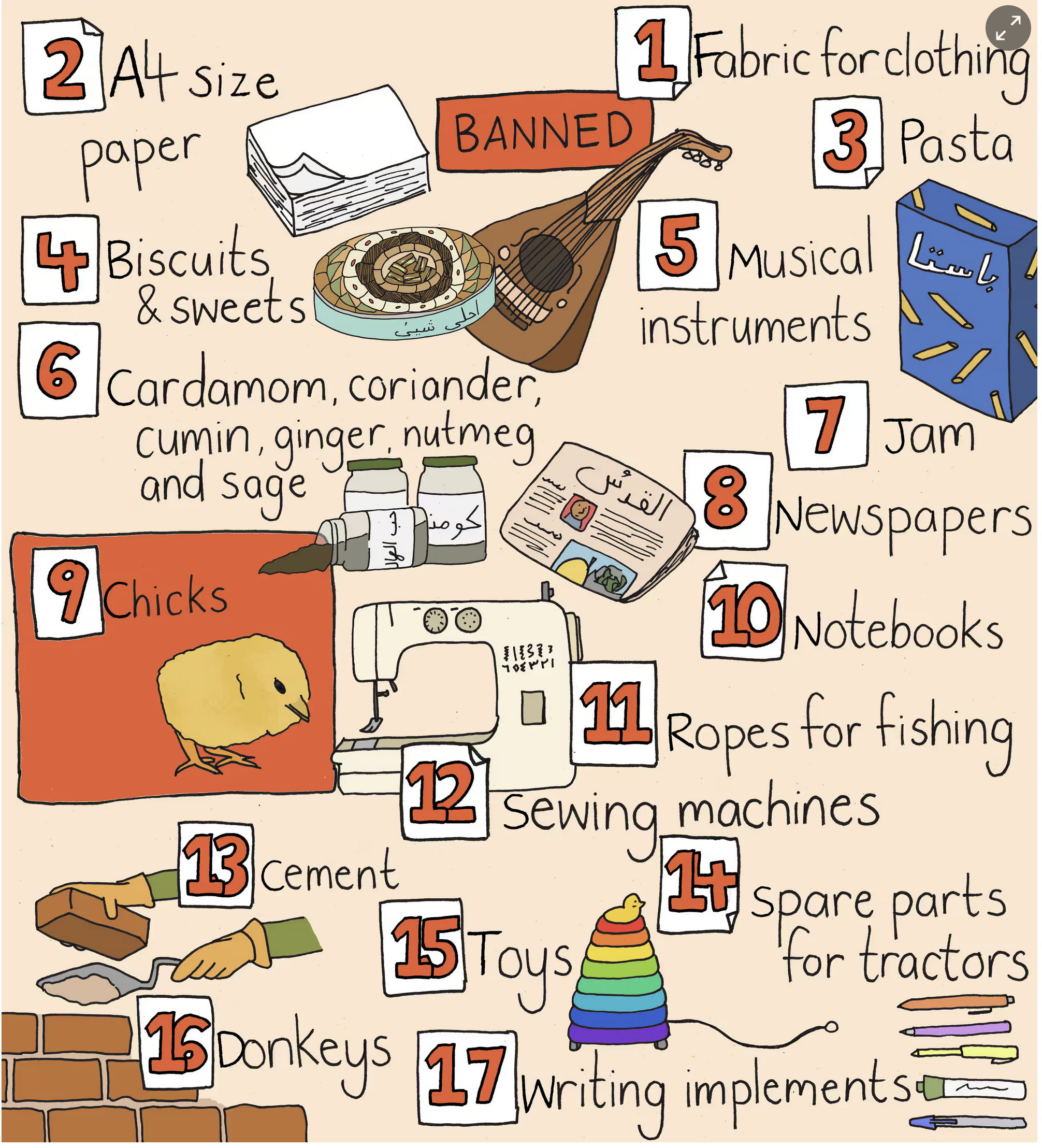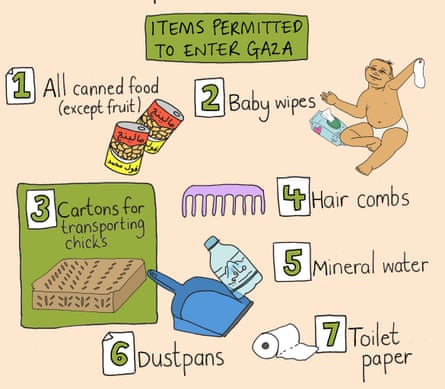The fluctuating policy has targeted a huge range of items, as tracked by an Israeli human rights group. The latest version of the blockade is nearly total

Moustafa Bayoumi and Mona ChalabiMon 24 Jun 2024 16.02 CESTLast modified on Mon 24 Jun 2024 16.04 CEST
Israel has long maintained a blockade of Gaza, at times allowing only products deemed “vital for the survival of the civilian population” to enter. Gisha, an Israeli human rights group dedicated to the free movement of Palestinians, assembled lists of banned items – from newspapers to notebooks and spices to sweets – from conversations with Palestinian businesspeople and international organizations importing goods into the strip. These graphics illustrate some of what was allowed in and what was barred from entry between 2007 and 2010, based on Gisha’s findings.
Israel had already been limiting the movement of goods and people between Gaza and the West Bank at least since the early 1990s. In 2006, after Hamas won 74 out of 132 seats in the Palestinian legislative elections, Israel escalated its blockade, imposed the year before, hoping to make life so difficult for the Palestinians of Gaza that they would turn on Hamas out of desperation. Dov Weisglass, an adviser to Ehud Olmert, the Israeli prime minister at the time, described the strategy this way: “The idea is to put the Palestinians on a diet,” Weisglass said, “but not to make them die of hunger.”
It didn’t work. By the summer of 2007, Hamas had battled its adversary Fatah in the streets of Gaza and prevailed. The group took control over the Gaza Strip and Israel responded by making its blockade permanent, severely limiting Gaza’s access to the outside world. The blockade was formalized to such a degree that the Israeli military commissioned its own internal study determining the minimum number of calories Palestinians would need to avoid malnutrition.

The blockade would ease and tighten over the years. Illustration: Mona Chalabi/The Guardian
International outcry over the blockade was growing louder, and in late May 2010, a group of ships – the Gaza Freedom Flotilla – set sail to break the blockade. Previous smaller missions had succeeded in bringing some relief to Gaza (as had Gaza’s extensive underground tunnel system). This time, 10,000 tons of aid was onboard the ships. Israeli commandos attacked the Mavi Marmara, the largest vessel in the group, in international waters, killing nine people.
By June 2010, perhaps due to the outrage over the attack on the Mavi Marmara, Israel began easing its blockade, and it allowed some consumer goods finally back into Gaza. “Gisha is pleased to learn that coriander no longer represents a threat to Israeli security,” the organization wrote in a statement.
Israel created a list of “dual use” items, banned because they are capable of being repurposed for military objectives, in 2008 but only made that list public in 2010. A 2022 Oxfam report found that Israel’s restrictions on “dual use” items – including, for example, water and sewage pumps – far exceed international standards. “The process of listing materials as ‘dual-use’ appears arbitrary and is non-transparent,” Oxfam concluded.
The blockade would ease and tighten over the years. In 2018, more than 1,000 basic commodities were again banned from entering Gaza – including wedding dresses, cleaning sponges, baby bottles and diapers – along with fuel and gas deliveries after Israel partially sealed Gaza’s commercial border crossing in retaliation for some Gazans setting fires in Israel using flaming kites and balloons.
Since 7 October, the blockade has become nearly total. Restrictions to food and basic supplies now threaten the very survival of Gaza’s civilian population. In March 2024, CNN reported on the items Israel has been most frequently denying to Gazans, usually on the pretext that these are “dual use” items. CNN lists some of the most common ones: ventilators, oxygen cylinders, anesthetics, water filtration systems, X-ray machines and crutches.
Other articles that Israel has denied include “dates, sleeping bags, medicines to treat cancer, water purification tablets and maternity kits”, according to the report. Dates could be a lifeline to a starving a population, but they were blocked from entering Gaza because, sources told CNN, the seeds made dates look suspicious in X-ray inspection images. Sleeping bags were denied “because they were the color green”, a humanitarian official told CNN, “and green means military and according to the 2008 list, military is dual use”. What began as a deliberate policy to bring Gaza’s economy grinding to a standstill is now being used to bring its civilian population to its knees.
